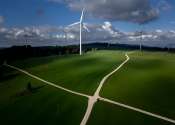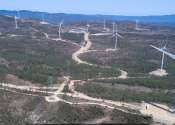Swiss approve law boosting renewable energy generation
Switzerland approved a law on Sunday aimed at accelerating the development of renewable energies, as part of the country's bid to attain carbon neutrality by 2050.
Jun 10, 2024
0
12
Energy & Green Tech

Switzerland approved a law on Sunday aimed at accelerating the development of renewable energies, as part of the country's bid to attain carbon neutrality by 2050.
Jun 10, 2024
0
12
Energy & Green Tech

As the urgency of climate change ramps up, focus is increasing on digital currencies to address their environmental impact.
Jun 9, 2024
1
1
Energy & Green Tech

Swiss voters were expected to approve in a referendum Sunday a law aimed at accelerating the development of renewable energy as the country aims for carbon neutrality by 2050.
Jun 9, 2024
0
39
Energy & Green Tech

Earth is facing a human-driven climate crisis, which demands a rapid transition to low-carbon energy sources such as wind and solar power. But we're also living through a mass extinction event. Never before in human history ...
Jun 8, 2024
0
1
Energy & Green Tech

The quest for efficient and clean energy sources has led to the exploration of ammonia as a hydrogen carrier due to its high hydrogen content, energy density, and ease of liquefaction. Solid oxide fuel cells (SOFCs) are highly ...
Jun 7, 2024
0
1
Energy & Green Tech

The sun beats down from a cloudless sky on the town of Boundiali, where Ivory Coast's first solar power plant embodies the drive to embrace clean energy without abandoning fossil fuels.
Jun 7, 2024
0
1
Engineering

The EOLO group of the University of the Basque Country (UPV/EHU) presents a new method for analyzing the long-term mechanical fatigue of floating offshore wind turbines.
Jun 6, 2024
0
40
Energy & Green Tech

Across the African continent, more than 300 new hydropower projects are planned to meet the growing demand for electricity. Some of these will require big dams, which can have major negative environmental impacts. Another ...
Jun 6, 2024
0
7
Energy & Green Tech

More money is pouring into solar power than all other electricity sources combined, with investments set to reach half a trillion dollars this year, the world's top energy research body said Thursday.
Jun 6, 2024
0
32
Energy & Green Tech

Switzerland's largest wind farm, sitting astride the ridge of the Jura mountains by the French border, consists of only 16 turbines -- tiny compared to those of other European countries.
Jun 6, 2024
0
1
In physics, energy (from the Greek ἐνέργεια - energeia, "activity, operation", from ἐνεργός - energos, "active, working") is a scalar physical quantity that describes the amount of work that can be performed by a force, an attribute of objects and systems that is subject to a conservation law. Different forms of energy include kinetic, potential, thermal, gravitational, sound, light, elastic, and electromagnetic energy. The forms of energy are often named after a related force.
Any form of energy can be transformed into another form, but the total energy always remains the same. This principle, the conservation of energy, was first postulated in the early 19th century, and applies to any isolated system. According to Noether's theorem, the conservation of energy is a consequence of the fact that the laws of physics do not change over time.
Although the total energy of a system does not change with time, its value may depend on the frame of reference. For example, a seated passenger in a moving airplane has zero kinetic energy relative to the airplane, but non-zero kinetic energy relative to the Earth.
This text uses material from Wikipedia, licensed under CC BY-SA